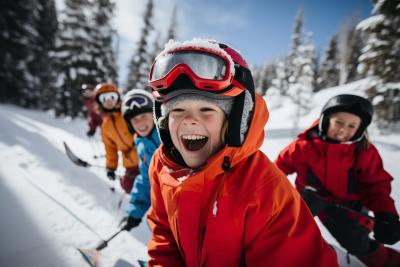Winter Sports and Snow Safety

Oh the weather outside is frightful, Wait, not if you’re a kid… it’s a winter wonderland full of activities, sledding, skiing, snowboarding, playing in the snow and even shoveling the walkways. Once kids are outdoors, we need to take some different precautions to keep them safe.
It’s fun (and healthy for our minds and bodies) to get outside and play. Here are some winter and snow safety tips for your family:
Common Injuries
Certain injuries are more common in the winter because cold-weather activities like ice-skating, sledding, snowboarding, and skiing can lead to accidents that often involve kids.
Once snow starts drawing more kids out in the cold weather to sled, ski and snowboard, Emergency Rooms may start seeing more fractures, abdominal, head, and neck injuries in those who run into trees, large rocks or even each other.
Dressing for the Cold
Kids should dress warmly for activities in the cold and snow, multiple layers of clothing are helpful to keep kids warm. Hats and warm gloves or mittens are a must for keeping warm and preventing frostbite and frostnip. Frostnip is an early sign of frostbite. It can cause the skin to be red, numb or tingly. If starting to see effects of frostnip on your children, it may be time to take a break inside. Warm the body part up with warm (not hot water) until sensation returns to normal.
While you’re at it, don’t forget the sunscreen; snow is very reflective and can cause sunburn even on the cloudiest days.
Winter Sports Safety
Helmets! Helmets! Helmets!
Sledding, riding and skiing can cause serious injuries including broken bones, and trauma to the head/neck and abdomen. Always supervise your children while outdoors. Avoid sledding, riding or skiing in areas with steep hills, lots of trees or rocks and be especially careful near roads! Helmets are a must for skiing and riding and should be worn for sledding too; a multisport or ski/board helmet works well for sledding and a bike helmet will work in a pinch.
Ice Hockey and ice skating are great cold-weather activities, but in this area, it rarely gets cold enough for water to freeze safety to skate in open ponds/creeks so keep to inside rinks and wear properly fitted skates and a helmet to protect against falls.
Here are some more winter safety tips from The American Academy of Pediatrics:
Call our office to schedule an appointment with a provider or talk with our Triage Nurses for specific advice.
